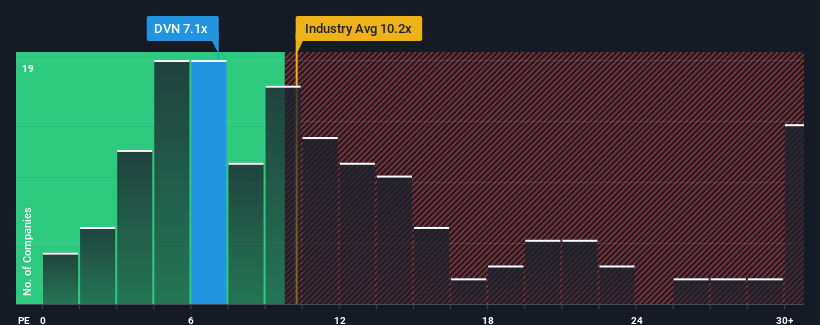- United States
- /
- Oil and Gas
- /
- NYSE:DVN
The Market Doesn't Like What It Sees From Devon Energy Corporation's (NYSE:DVN) Earnings Yet

When close to half the companies in the United States have price-to-earnings ratios (or "P/E's") above 19x, you may consider Devon Energy Corporation (NYSE:DVN) as a highly attractive investment with its 7.1x P/E ratio. Nonetheless, we'd need to dig a little deeper to determine if there is a rational basis for the highly reduced P/E.
Devon Energy has been struggling lately as its earnings have declined faster than most other companies. It seems that many are expecting the dismal earnings performance to persist, which has repressed the P/E. You'd much rather the company wasn't bleeding earnings if you still believe in the business. Or at the very least, you'd be hoping the earnings slide doesn't get any worse if your plan is to pick up some stock while it's out of favour.
See our latest analysis for Devon Energy

Does Growth Match The Low P/E?
In order to justify its P/E ratio, Devon Energy would need to produce anemic growth that's substantially trailing the market.
Retrospectively, the last year delivered a frustrating 25% decrease to the company's bottom line. Still, the latest three year period has seen an excellent 943% overall rise in EPS, in spite of its unsatisfying short-term performance. Accordingly, while they would have preferred to keep the run going, shareholders would probably welcome the medium-term rates of earnings growth.
Turning to the outlook, the next three years should bring diminished returns, with earnings decreasing 0.08% per annum as estimated by the analysts watching the company. Meanwhile, the broader market is forecast to expand by 10% per annum, which paints a poor picture.
In light of this, it's understandable that Devon Energy's P/E would sit below the majority of other companies. Nonetheless, there's no guarantee the P/E has reached a floor yet with earnings going in reverse. There's potential for the P/E to fall to even lower levels if the company doesn't improve its profitability.
What We Can Learn From Devon Energy's P/E?
Using the price-to-earnings ratio alone to determine if you should sell your stock isn't sensible, however it can be a practical guide to the company's future prospects.
We've established that Devon Energy maintains its low P/E on the weakness of its forecast for sliding earnings, as expected. At this stage investors feel the potential for an improvement in earnings isn't great enough to justify a higher P/E ratio. Unless these conditions improve, they will continue to form a barrier for the share price around these levels.
It is also worth noting that we have found 2 warning signs for Devon Energy (1 is potentially serious!) that you need to take into consideration.
If you're unsure about the strength of Devon Energy's business, why not explore our interactive list of stocks with solid business fundamentals for some other companies you may have missed.
New: Manage All Your Stock Portfolios in One Place
We've created the ultimate portfolio companion for stock investors, and it's free.
• Connect an unlimited number of Portfolios and see your total in one currency
• Be alerted to new Warning Signs or Risks via email or mobile
• Track the Fair Value of your stocks
Have feedback on this article? Concerned about the content? Get in touch with us directly. Alternatively, email editorial-team (at) simplywallst.com.
This article by Simply Wall St is general in nature. We provide commentary based on historical data and analyst forecasts only using an unbiased methodology and our articles are not intended to be financial advice. It does not constitute a recommendation to buy or sell any stock, and does not take account of your objectives, or your financial situation. We aim to bring you long-term focused analysis driven by fundamental data. Note that our analysis may not factor in the latest price-sensitive company announcements or qualitative material. Simply Wall St has no position in any stocks mentioned.
About NYSE:DVN
Devon Energy
An independent energy company, engages in the exploration, development, and production of oil, natural gas, and natural gas liquids in the United States.
Undervalued with adequate balance sheet.
Similar Companies
Market Insights
Community Narratives



